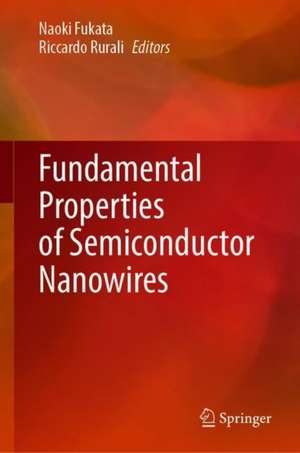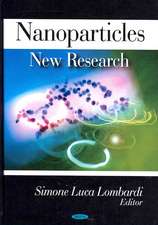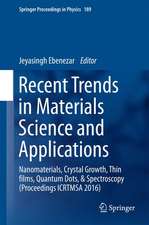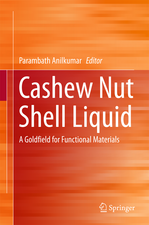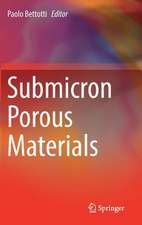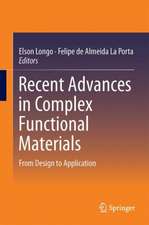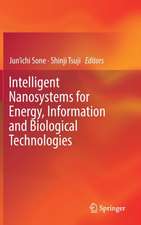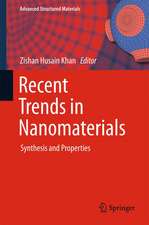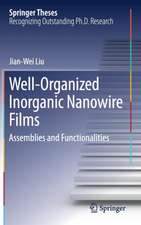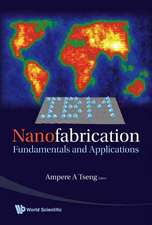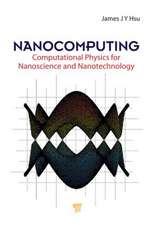Fundamental Properties of Semiconductor Nanowires
Editat de Naoki Fukata, Riccardo Ruralien Limba Engleză Hardback – 17 noi 2020
This book covers virtually all aspects of semiconductor nanowires, from growth to related applications, in detail. First, it addresses nanowires’ growth mechanism, one of the most important topics at the forefront of nanowire research. The focus then shifts to surface functionalization: nanowires have a high surface-to-volume ratio and thus are well-suited to surface modification, which effectively functionalizes them. The book also discusses the latest advances in the study of impurity doping, a crucial process in nanowires. In addition, considerable attention is paid to characterization techniques such as nanoscale and in situ methods, which are indispensable for understanding the novel properties of nanowires. Theoretical calculations are also essential to understanding nanowires’ characteristics, particularly those that derive directly from their special nature as one-dimensional nanoscale structures. In closing, the book considers future applications of nanowire structures indevices such as FETs and lasers.
| Toate formatele și edițiile | Preț | Express |
|---|---|---|
| Paperback (1) | 952.40 lei 3-5 săpt. | |
| Springer Nature Singapore – 17 noi 2021 | 952.40 lei 3-5 săpt. | |
| Hardback (1) | 958.56 lei 6-8 săpt. | |
| Springer Nature Singapore – 17 noi 2020 | 958.56 lei 6-8 săpt. |
Preț: 958.56 lei
Preț vechi: 1168.98 lei
-18% Nou
Puncte Express: 1438
Preț estimativ în valută:
183.44€ • 190.43$ • 152.96£
183.44€ • 190.43$ • 152.96£
Carte tipărită la comandă
Livrare economică 24 martie-07 aprilie
Preluare comenzi: 021 569.72.76
Specificații
ISBN-13: 9789811590498
ISBN-10: 9811590494
Ilustrații: VIII, 454 p. 219 illus., 196 illus. in color.
Dimensiuni: 155 x 235 mm
Greutate: 0.82 kg
Ediția:1st ed. 2021
Editura: Springer Nature Singapore
Colecția Springer
Locul publicării:Singapore, Singapore
ISBN-10: 9811590494
Ilustrații: VIII, 454 p. 219 illus., 196 illus. in color.
Dimensiuni: 155 x 235 mm
Greutate: 0.82 kg
Ediția:1st ed. 2021
Editura: Springer Nature Singapore
Colecția Springer
Locul publicării:Singapore, Singapore
Cuprins
Part I: Growth.- 1. Growth.- Part II: Functionalization.- 2. Surface science.- 3. Doping.- Part III: Characterization.- 4. In-situ TEM.- 5. Time-resolved in-situ X-ray.- 6. Characterisation of semiconductor nanowires by electron beam induced microscopy and cathodoluminescence.-
7. Optical Spectroscopy.- 8. Raman Spectroscopy.- 9. First-principles calculations.- Part IV: Applications.- 10. FET.- 11. Laser.
Notă biografică
Naoki Fukata is Leader of the Nanostructured Semiconducting Materials Group, International Center for Materials Nanoarchitectonics (MANA), National Institute for Materials Science (NIMS), Japan. Holding a Ph.D. in Engineering from the University of Tsukuba, he has served as an Associate Professor at Tohoku University and then as a Lecturer at the University of Tsukuba; he has been working at the NIMS since 2005. He has published 160 articles in internationally respected journals such as Advanced Materials, Nano Letters, ACS NANO, Nano Energy, Physical Review Letters, and Physical Review B, and contributed to two books. His research group focuses on the functionalization of semiconducting nanomaterials such as nanowires for applications in next-generation high-speed transistors and high-efficiency solar cells.
Riccardo Rurali received his Ph.D. from the Universitat Autònoma de Barcelona in 2003. His research interests focuson the theoretical modeling of nanostructured semiconductors using various computational techniques, particularly with regard to their structural, electronic, and thermal properties. He is currently a tenured scientist at the Institut de Ciència de Materials de Barcelona (ICMAB-CSIC), where he has also served as Deputy Director since 2015. He is the author of more than 100 articles published in internationally respected journals such as Science, Nature Nanotechnology, Nano Letters, ACS Nano, Advanced Materials and Physical Review Letters.
Textul de pe ultima copertă
This book covers virtually all aspects of semiconductor nanowires, from growth to related applications, in detail. First, it addresses nanowires’ growth mechanism, one of the most important topics at the forefront of nanowire research. The focus then shifts to surface functionalization: nanowires have a high surface-to-volume ratio and thus are well-suited to surface modification, which effectively functionalizes them. The book also discusses the latest advances in the study of impurity doping, a crucial process in nanowires. In addition, considerable attention is paid to characterization techniques such as nanoscale and in situ methods, which are indispensable for understanding the novel properties of nanowires. Theoretical calculations are also essential to understanding nanowires’ characteristics, particularly those that derive directly from their special nature as one-dimensional nanoscale structures. In closing, the book considers future applications of nanowire structures in devices such as FETs and lasers.
Caracteristici
Provides detailed coverage of virtually all aspects of nanowires, from growth to applications Includes thorough explanations of nanowires’ growth mechanism and functionalization Offers readers a comprehensive understanding of the fundamental properties and applications of nanowires
